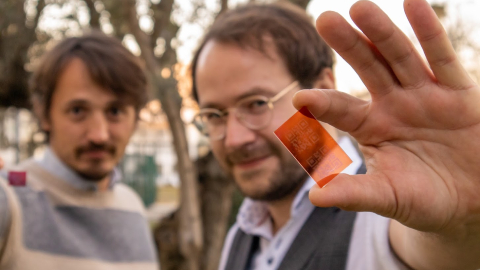Molecular Gate S.L., new ICMAB-CSIC and BeAble Capital spin-off

Molecular Gate S.L. aims to become a key player in the anti-counterfeiting industry, particularly in the health sector. The cost-effective technology developed by the company will ensure the authenticity of pharmaceutical products using smart optical printed elements on the products.
17/03/2022
The new spin-off, Molecular Gate S.L, created by researchers Mariano Campoy-Quiles and Aleksandr Perevedentsev from the Institute of Materials Science of Barcelona (ICMAB-CSIC), aims to provide a range of unique and cost-effective security solutions for the pharmaceutical market, which will help to verify the authenticity of products such as vaccines, and ensure their proper handling during storage and transportation. Researchers envisage that the technology “will not only enable straightforward visual and machine-readable verification, but will also be near-impossible to counterfeit by alternative methods”.
The spin-off has been created together with BeAble Capital team, a fund manager specialized in Science Equity (technology transfer in Deep Science) who, as well as providing the necessary investment, will support the company in shaping the business strategy to exploit the niche in the market.
The technology that this spin-off will develop consists of creating anti-counterfeit elements for the packaging typically used in the pharmaceutical industry, including bottles and blisters, to ensure that the contained products are authentic. This is vitally important not only for the final consumer to guarantee that they are taking the authentic medicine with certified effectiveness, but also for the pharmaceutical companies themselves in order to safeguard their reputation in the marketplace.
“The existing security solutions in the market have numerous limitations; they are often expensive and bulky, and most require UV-free or cold-chain handling, which introduce transportation and end-use constrains” explains Aleksandr Perevedentsev. Moreover, most current solutions only target security either at the “company” level, by adding a hidden security feature to authenticate the packaging if required. “Customer”-level security is more desirable and versatile, but simultaneously more difficult to implement since holograms are now considered insufficiently secure while other security solutions are often too expensive to produce or require specialized hardware or software for verification.
Molecular Gate S.L. aims to provide a two-level anti-counterfeiting technology, both for consumers and companies, with a single printed element on the pharmaceutical products, which can be easily scanned using a mobile phone, but is almost impossible to replicate since it requires the patented technology licensed from CSIC to the company.
The technology is based on a unique and versatile method to control the nanostructure, molecular orientation and composition of different materials and thin films at local level, with high speed and resolution.
“While thinking of potential applications of this technology, we remembered the work of our friend and colleague Prof. Paul Smith (ETH Zurich), who introduced polarizing elements as security features in the Swiss bank notes” explains Mariano Campoy-Quiles. “We realized that we could go one step further on that field, as our technology allowed writing patterns and drawings that were polarized in different directions, i.e. with polymer chains oriented in different directions at the micrometer scale”.
The idea is, as with an invisible ink, that the patterned security element is only revealed when observed with a simple polarizing system like a mobile phone camera, while remaining invisible to the naked eye.